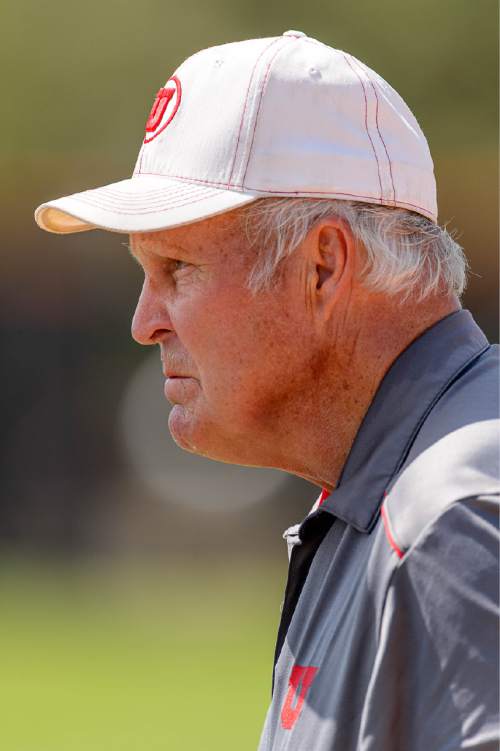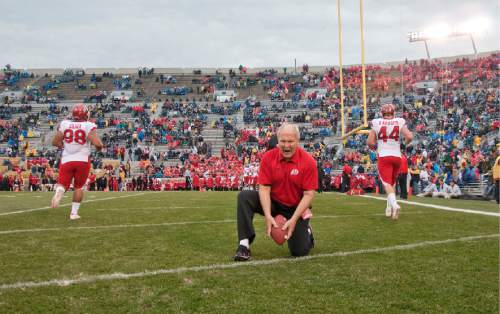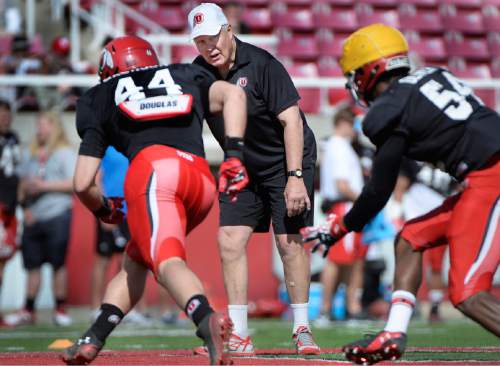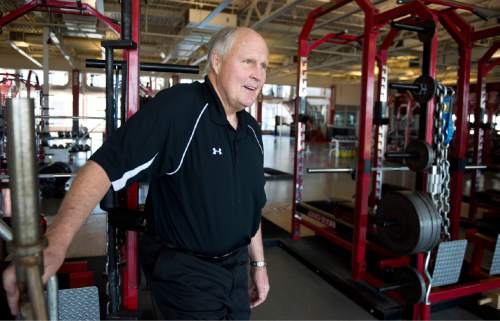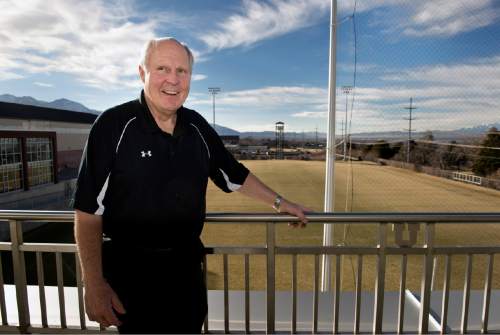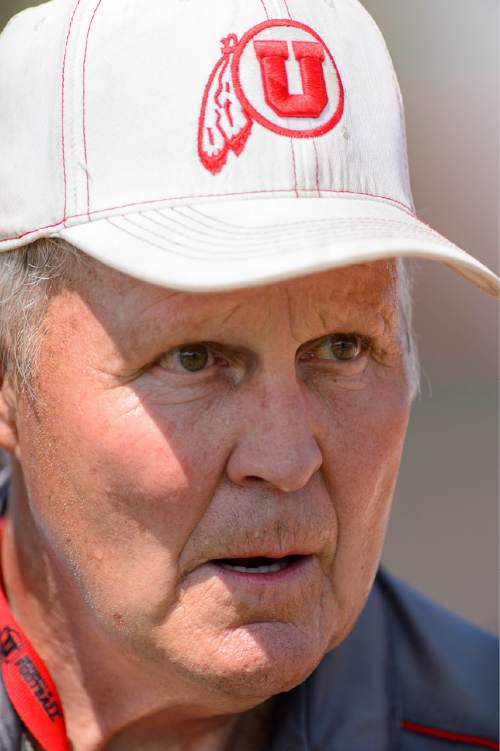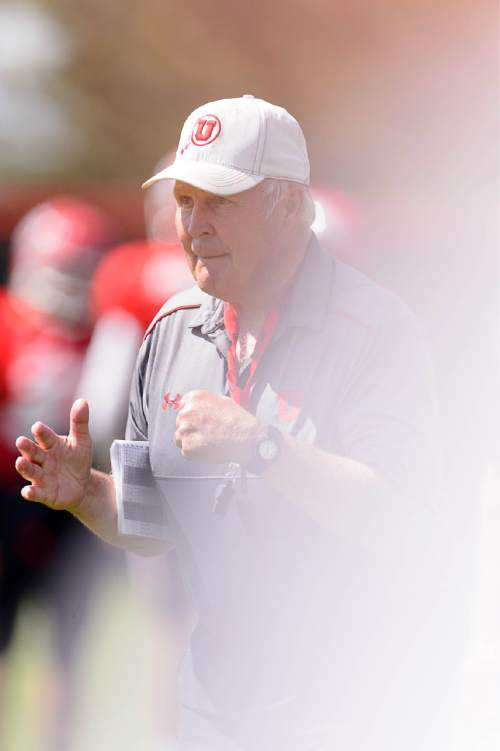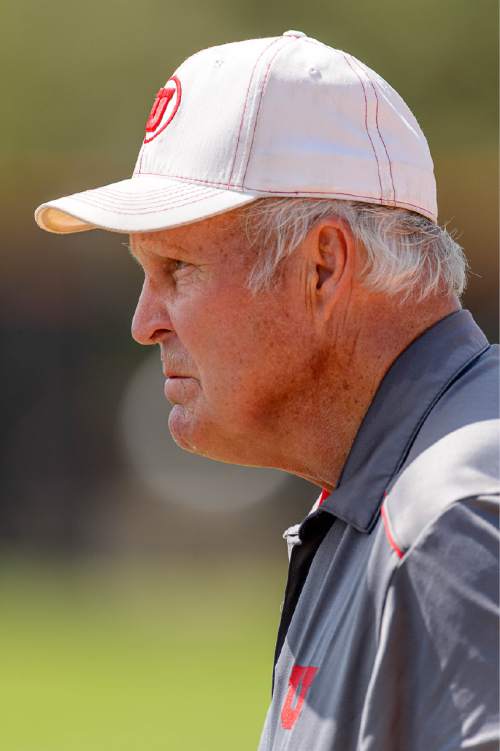This is an archived article that was published on sltrib.com in 2015, and information in the article may be outdated. It is provided only for personal research purposes and may not be reprinted.
John Pease is talking football, talking the beautiful physicality of football, talking defense, talking Utah defense, talking coaching defense, talking coaching defense for nearly 50 years, talking hitting people, talking the art of teaching and the art of learning, talking the importance of loving players, talking the importance of players loving players, talking Jerry Rice and Deion Sanders and Tom Coughlin and Don James and Clyde Simmons and Kyle Whittingham and Hunter Dimick and Jared Norris and Jason Fanaika, talking the effort and commitment it takes to win, talking human nature, talking … talking … talking … talking.
He's talking in the humble manner and broken cadence of a crusty buzzard who has pretty much lapped everybody else, who would never come right out and say it, but who's forgotten more about George Halas' game than you and you and you and me and him and her and them and any and all of the rest of us ever knew.
And, then, like a spigot turned off, he's done talking.
Now, he wants to get out on the field and get busy.
It's his life's calling. His life's work and pleasure. His life.
Box him inside the four walls of an office for too long, or give him too much down time, even in his eighth decade of living, and he might well blow apart into a million bits and pieces. Pease's wife, Chris, once famously said of him: "Living with John when he doesn't have enough to do is like being in a phone booth with a full-grown golden retriever."
More perfectly descriptive words have never been spoken about a coach, a coach who played at Utah back in the early 1960s, whose coaching journey has meandered into and out of many stops, at small and big schools, through the NFL, and, not so long ago, with the Utes. This is his fourth go-round at Utah.
The Utes' first-year defensive coordinator, the man brought in to replace Kalani Sitake, isn't new at all. He's new in the same way a vintage 1958 Chevrolet Apache step side short bed is new. He's been around the block, down hundreds of dusty roads, across a thousand fields of crop. He's just fully restored and ready to roll.
"I've got suggestions for my players," he says, "because I've been coaching a lot of years."
His last stint before this one was here at Utah, where he coached the defensive line. He retired in 2010, in part because of health issues. But, rebuilt and recovered, the old pickup is motoring again. Whittingham hired him when Sitake took off for Oregon State and Pease was eager to get back in, to inspire toughness, to embrace the game, one more time.
"Football is the greatest team game in the world because the object is to hit someone on every down," he says. "There's no other team game where the object is to hit the one in front of you. I enjoy it. Football players are always moving toward something. They're not passive. They're not afraid. They're emotional. It's an emotional game and emotional kids play it. I love that.
"If you want to find out what somebody's really about, go 10 days of two-a-days in the heat, getting all bruised and bloodied up, you're going to discover the guys you want to be with in a street fight."
Football, to Pease, is a street fight. And he admires boulevard brawlers.
"One of my favorite guys was Jim McMahon," he says. "And that whole group they had at BYU the year they won [the Holiday Bowl against SMU]. They're down and he comes off the field and says, 'You want to win this game? Let me throw the ball.' And LaVell says, 'OK.' That kind of fight, that kind of camaraderie wins football games. I hope that's what we have here."
What the Utes have in 2015, Pease is bullish on.
"We're pretty damn good," he says.
How good will depend not so much on physical abilities, which Pease says are already in place. Instead, he says, success will turn on the character of the individual players and how they grow together: "It doesn't depend on what Kyle Whittingham or John Pease wants or says. It's how important this is to them. They have to make it their team. If these guys can become accountable to themselves and each other, then we'll be in business."
Pease says the Utes' best players must do more than their own jobs, they must take the others under wing. He learned that from watching Hall-of-Famers Rice and Sanders while he was coaching in the NFL. "They would stay after practice and work with other guys," he says. "When the lights came on, Sanders was Neon Deion. But if teammates wanted to do something better, he would stay after practice out on the field and work with them."
The old coach shakes his head.
"Give me 11 guys like that, the ones who, however good they are, give all they can for the team, and I'll take them and win with them."
That's the attitudinal baseline, the common foundation a team needs, Pease says.
He adds that individual players learn differently. It's his job to uncover how his defenders grasp their position nuances best and instruct them accordingly. If they learn and care as a group, the extra spark happens.
"There are three kinds of learning," he says. "The first is auditory. I tell them and they get it. The second is visual. They see it on the screen and adjust. The third is kinesthetic. They do it, feel it, learn it. Everybody is different and some are a mix. There's no right or wrong way. I was the son of a nuclear scientist and I grew up around the kids of nuclear physicists. I used to sit in the classroom, looking around, thinking, 'When is recess? Get me out of here.' I was a kinesthetic learner. I understand those guys because I was one."
The years have made Pease more book smart. The rings around his trunk have made him wise.
He says he motivates his players by helping them, not yelling at them: "All that screaming coaches do is overrated. Great pregame speeches are good — until somebody hits you. I teach the kids during the week, and then tell them to go out and play." Still, the one thing he cannot tolerate is a lack of hustle.
Philosophically, Pease believes in stopping the run first, or as he says it, "Ass-kicking starts up front. You stop the run game and then go to your speed. It's not that complicated."
Whittingham says Pease is exactly what this year's defense needs.
"He's a passionate, energetic guy. The players love him. He came in here, he didn't try to re-invent the wheel. He knows our schemes and what we do. … It's been a seamless transition."
Speaking of his 2015 defense, Pease says he has a plethora of athletes in the fold who "can perform toward the next level," as in, move on to the NFL. "We don't have problems, we have kids who can play," he says, rattling off the names … Dimick, Norris, Fanaika, Filipo Mokofisi, Lowell Lotulelei, Reggie Porter, and 10 more. First, they must handle the college game, handle it by mastering themselves.
The old man and the D quotes John Wooden, quotes Coughlin, quotes James, quotes guys whose names he can't remember to underscore significant points he wants to make. He tells 10 or 20 tales.
Most of all, he stresses the importance of his defense taking ownership of itself.
"That's what great teams do, it's what they are," he says. "It's about them. It is them. They take care of each other."
GORDON MONSON hosts "The Big Show" with Spence Checketts weekdays from 3-7 p.m. on 97.5 FM and 1280 AM The Zone. Twitter: @GordonMonson.


